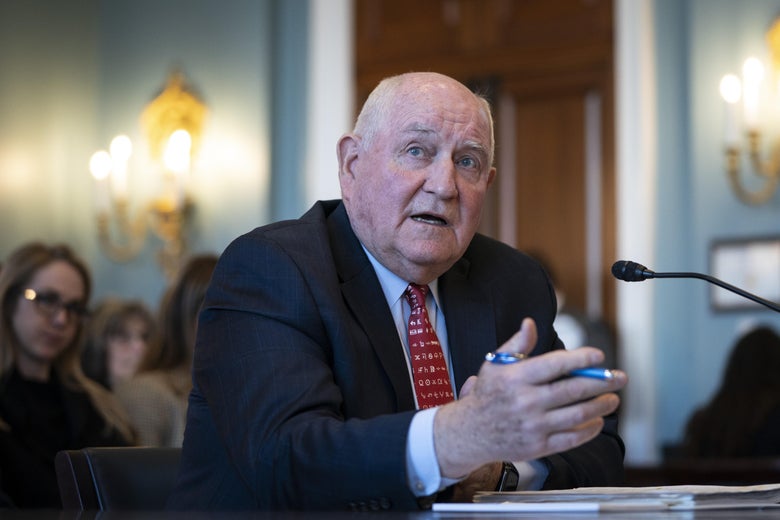
Secretary of Agriculture Sonny Perdue testifies during a House hearing on March 4, 2020. Perdue said Tuesday that the USDA would still enact the rule change even as some called for its delay during the pandemic.
Drew Angerer/Getty Images
Just a couple weeks before a Trump administration rule change was set to force 700,000 people to go off food stamps, a federal judge blocked the measure, citing concerns about how the coronavirus pandemic would affect the most vulnerable people in society.
The rule change, which was meant to go into effect on April 1, would have blocked states from being able to waive work requirements for the Supplemental Nutrition Assistance Program unless an area has a 6 percent or higher unemployment rate. Under the work requirements, able-bodied adults without children must work at least 20 hours a week for more than three months in a 36-month period. Nineteen states, along with the District of Columbia and New York City, sued to stop the rule change and preserve their ability to waive the work requirements.
In her ruling Friday night, D.C. District Court Judge Beryl Howell called the rule change “arbitrary and capricious” and therefore unlawful. She issued a national preliminary injunction on the change and chided the Department of Agriculture for failing to fully appreciate the harm that the rule change would do.
“Especially now, as a global pandemic poses widespread health risks, guaranteeing that government officials at both the federal and state levels have flexibility to address the nutritional needs of residents and ensure their well-being through programs like SNAP is essential,” she wrote.
The rule change was announced back in December, but some people have called for action from USDA on the matter since the coronavirus began spreading in the U.S. On Tuesday, Secretary of Agriculture Sonny Perdue said that the SNAP rule change would still go into effect.
He did, however, also say on Tuesday that he hoped Congress would reinstate an old program called P-SNAP, for Pandemic Supplemental Nutrition Assistance Program. A P-SNAP program was authorized in 2009 for the H1N1 pandemic but not used, according to Politico. That program would give households with children eligible for free and reduced-price school lunches extra assistance with food while schools are closed. It would therefore not have helped those who affected by the rule change, which threatened a large number of young and unemployed or underemployed people in particular.
Many experts believe that the American economy is already entering a recession due to the supply disruptions caused by the coronavirus. Economists also believe things will continue to get worse as people isolate themselves at home and avoid spending money on travel, entertainment, and non-essential consumer products. Many companies in more heavily affected industries have already begun laying off workers, and even though Congress is pushing a coronavirus relief bill meant to stimulate a lagging economy, it’s expected that low-income Americans will struggle even more as we head into a period of economic uncertainty.
The USDA will likely appeal their case in an attempt to implement the rule change.
Readers like you make our work possible. Help us continue to provide the reporting, commentary and criticism you won’t find anywhere else.
Join Slate Plusfrom Slate Magazine https://ift.tt/2TZOy9u
via IFTTT
沒有留言:
張貼留言